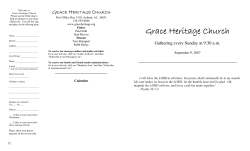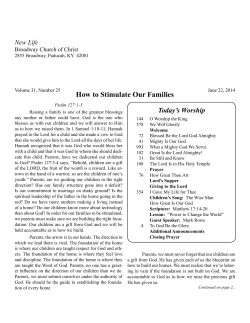
Living Victoriously in the End Times Celebration Series Editorial Staff
AD SP14 TM 193411:Layout 1 4/24/13 4:00 PM Page 1 Celebration Series Living Victoriously in the End Times Editorial Staff Richard M. Davis . . . . . . . . . . . . . . . . . . .Editor P. D. Buford . . . . . . . . . . . . . . . .Associate Editor Editor in Chief United Pentecostal Church International Robin Johnston Writer Robert L. Gilstrap Curriculum Committee James E. Boatman Donald Bryan P. D. Buford Daniel L. Butler Steve L. Cannon Richard M. Davis Jack C. Garrison G. W. Hassebrock Robin Johnston Jeremy Painter Jason Ramsey Charles A. Rutter Janice Sjostrand Rick L. Wyser When Satan tempts you to be skeptical and doubtful, have faith in the promises of the Lord Jesus Christ and enjoy victory. You will overcome and be supremely rewarded. —Lesson 7, page 53 © 2013 United Pentecostal Church International 8855 Dunn Road Hazelwood, MO 63042-2299 All rights reserved. Adult Teacher’s Manual Spring 2014 AD SP14 TM 193411:Layout 1 4/24/13 4:00 PM Page 2 Table of Contents Editorial . . . . . . . . . . . . . . . . . . . . . . . . . . . . . . . . . . . . . . . . . . . . . . 3 March week of March 2 March 9 March 16 March 23 March 30 Love God amid Idolatrous Times. . . . . . . . . . . . . 5 Have Hope amid Despair . . . . . . . . . . . . . . . . . 12 Love Truth amid False Doctrine . . . . . . . . . . . . 19 Love the Word amid Deception . . . . . . . . . . . . . 26 Love Jesus’ Name amid Mockery . . . . . . . . . . . 33 April week of April 6 April 13 April 20 April 27 Be Fervent amid Apostasy. . . . . . . . . . . . . . . . . 40 Have Faith amid Skepticism . . . . . . . . . . . . . . . 47 Flee amid Temptation . . . . . . . . . . . . . . . . . . . . 54 Love Jesus amid Persecution. . . . . . . . . . . . . . . 61 May week of May 4 May 11 May 18 May 25 Be Filled with the Spirit amid Carnality. . . . . . . 68 Be Faithful amid Fear and Doubt. . . . . . . . . . . . 75 Live in Praise & Worship amid Selfishness . . . . 82 Love People in a Materialistic World . . . . . . . . . 89 Scripture quotations marked (AMP) are taken from the Amplified Bible, Copyright © 1954, 1958, 1962, 1964, 1965, 1987 by The Lockman Foundation. Used by permission. Scripture quotations marked (ESV) are from The Holy Bible, English Standard Version® (ESV®), copyright 2001 by Crossway, a publishing ministry of Good News Publishers. Used by permission. All rights reserved. Scripture quotations marked "NKJV™" are taken from the New King James Version®. Copyright © 1982 by Thomas Nelson, Inc. Used by permission. All rights reserved. Scripture quotations marked (NLT) are taken from the Holy Bible, New Living Translation, copyright© 1996, 2004, 2007. Used by permission of Tyndale House Publishers, Inc., Carol Stream, Illinois 60188. All rights reserved. Scripture quotations marked (NIV) are taken from the HOLY BIBLE, NEW INTERNATIONAL VERSION®. NIV®. Copyright© 1973, 1978, 1984 by International Bible Society. Used by permission of Zondervan. All rights reserved. Adult Teacher’s Manual Editor: Richard M. Davis • Cover Design: Dennis Fiorini • Design: Karen Myers Manufactured in USA, March 2014, 193411. www.wordaflame.org AD SP14 TM 193411:Layout 1 4/24/13 4:00 PM Page 3 Editorial A Victorious People in a Victorious Church in the End Times by Richard M. Davis O Of all their characteristics, one of the most pronounced characteristics of God’s people is that they are victorious. God has called His people and destined them for victory—not with individual predestination, but as part of a predestined body, the church of Jesus Christ. When believers become and remain a part of the church, they cannot help but be victorious because they have aligned themselves with a group destined for ultimate victory. That includes those who find themselves a part of the church in the last days, the end times. I cannot tell you for certain these are the end times, but I can say without any reluctance they surely seem to line up with the biblical prophecies about the last days. I will leave it to you to judge for yourselves, but this quarter you will have many opportunities to consider the characteristics of the end times and contemplate whether those traits appear to describe our day. Surely we must be drawing near the Lord’s return. One thing is certain: these are some exciting lessons about end-time attitudes with which believers must contend, and they are prevalent attitudes today. Not only will we study the attitudes of the world, but we also will consider how victorious believers can deal with these negative attitudes and have victory in the midst of them. We are in this world, but we are not of this world. Further, this world is not our home; we’re only passing through. Our home is awaiting us in another realm! “If ye were of the world, the world would love his own: but because ye are not of the world, but I have chosen you out of the world, therefore the world hateth you” (John 15:19). With every lesson and end-time attitude presented, we will study an antidote for successfully dealing with each attitude. The biblical antidotes we present are the keys to maintaining victory as believers every day. Some of the end-time attitudes will cause us discomfort as believers and many will cause us to be weary, but we can keep our head high and our confidence securely fastened to our Savior. It is He who is empowering us daily to be victorious in the midst of pressing circumstances and annoying attitudes. The good news for believers is that no matter what negative and detrimental attitudes we may encounter in others, we are victorious through the power of Jesus Christ within! May this quarter of study enrich you, bless you, and anchor you steadfastly in the Savior. 3 AD SP14 TM 193411:Layout 1 4/24/13 4:00 PM Page 4 Preserving Apostolic Doctrine for Future Generations Word Aflame Publications If you love the apostolic doctrine, consider your part to preserve it for future generations by giving now or in your estate plans to the Word Aflame Endowment. Leaving a legacy of apostolic doctrine can be accomplished through a cash gift, gift of stock, estate gift in your will or living trust, or beneficiary gift of all or part of a life insurance policy. For more information, contact: United Pentecostal Foundation 8855 Dunn Road Hazelwood, MO 63042 314-837-7304 ext. 309 [email protected] 4 AD SP14 TM 193411:Layout 1 4/24/13 4:00 PM Page 5 Living Victoriously in the End Times Love God amid Idolatrous Times 1 week of 03.02.14 Lesson Text Psalm 135:15-18 15 The idols of the heathen are silver and gold, the work of men's hands. 16 They have mouths, but they speak not; eyes have they, but they see not; 17 They have ears, but they hear not; neither is there any breath in their mouths. 18 They that make them are like unto them: so is every one that trusteth in them. II Timothy 3:1-4 1 This know also, that in the last days perilous times shall come. 2 For men shall be lovers of their own selves, covetous, boasters, proud, blasphemers, disobedient to parents, unthankful, unholy, 3 Without natural affection, trucebreakers, false accusers, incontinent, fierce, despisers of those that are good, 4 Traitors, heady, highminded, lovers of pleasures more than lovers of God. Focus Thought In the end times, idolatry often shifts from objects made by humans to the human himself. However, genuine love for God shatters humanism. Mark 12:30 30 And thou shalt love the Lord thy God with all thy heart, and with all thy soul, and with all thy mind, and with all thy strength: this is the first commandment. Focus Verse II Timothy 3:4 Traitors, heady, highminded, lovers of pleasures more than lovers of God. 5 AD SP14 TM 193411:Layout 1 4/24/13 4:00 PM Page 6 Culture Connection Who Do You Love? by Gary D. Erickson U US Vice-President Joe Biden defended the recognition of homosexual unions as marriage during the 2012 presidential campaign with this question: “Who do you love?” (originally the title of a rock-and-roll song written and recorded in 1956 by Bo Diddley). That pleasant-sounding question was parroted frequently in the media in defense of this social and cultural anomaly. By interjecting “love” into the debate, he made another destructive furrow in the eroding moral foundation of America. Even in these days of deteriorating moral commitments, people still have respect for the power of love. Incorporating love into the debate was a clever trick used to confuse people who lack a good moral footing. Affection itself is not pure or virtuous. We can love the wrong things. Our love for them does not make them or us pure. If our love for something or someone causes us to break God’s law, it is not wholesome. For most of us, this is an obvious truth; but today many people are confused. Having a love for God and His Word are the only things that can save us from the crosswinds of postmodern confusion. Perverted affections and false philosophies can appear virtuous to an unsanctified heart. This reminds us why Jesus emphasized the first commandment: “Thou shalt love the Lord thy God with all thy heart, and with all thy soul, and with all thy mind. This is the first and great commandment” (Matthew 22:37-38). I. END-TIMES ATTITUDE—IDOLATRY A. Love for Self B. Hate for God’s Order II. ANTIDOTE—LOVE GOD A. The Greatest Commandment B. The Greatest Power C. The Greatest Motivation D. The Greatest Privilege Contemplating the Topic There is in every person a need to worship. It is an innate desire placed there by the Creator. Over the centuries humans have responded to this need by worshiping either God or an idol—the true God or a false god. Sadly, in our day idolatry often involves not only the worship of false gods, but also the elevation of material possessions, human stars and personalities, and self. Many individuals, who would never worship a carved or molded idol, unwittingly are guilty of worshiping these contemporary things. Simply, a carnal Christian can be guilty of idolatry even though he may never bow to an image or enter a heathen temple. The word amid in the title of this lesson not only defines the location of our love, but it underscores our involvement in life with all its cultural challenges. We are caught in the middle of everything that comprises the last days. Yet, while we are in the midst of evil 6 surroundings, God’s goodness is in our midst. For He said, “Where two or three are gathered together in my name, there am I in the midst of them” (Matthew 18:20). If we have God in our midst, it will not be difficult to love Him and be faithful to Him in the midst of idolatrous times. II Chronicles 13:14-15 illustrates the solution to being surrounded by the enemy: “And when Judah looked back, behold, the battle was before and behind: and they cried unto the LORD, and the priest sounded with the trumpets. Then the men of Judah gave a shout: and as the men of Judah shouted, it came to pass, that God smote Jeroboam and all Israel before Abijah and Judah.” When surrounded by evil, we should shout our praises unto God, trusting for His deliverance! In this lesson we will study idolatry and its by-products. We will observe how idolatry produces love for self and hatred for God’s order. Further, we will study idolatry’s antidote, the love of God, which is the greatest commandment, power, motivation, and privilege. Transparency 1 Transparency 1 states, “An idol is anything that receives worship and veneration belonging to God alone.” AD SP14 TM 193411:Layout 1 4/24/13 4:00 PM Simply stated, idolatry is the worship of an idol, and an idol is anything that receives the worship and veneration belonging to God alone. It is also extreme admiration for, or devotion to, anything other than God. Christians must not allow their worship to include anything other than the one true God. Searching the Scriptures I. END-TIMES ATTITUDE—IDOLATRY It seems every generation reflects its own attitude. Only a psychologist could explain why this occurs, but we do not have to be psychologists to observe the phenomenon. Unfortunately, this age exhibits an attitude of idolatry—idolatry that appears in the form of humanism, which focuses on and worships humankind and their achievements. Idolatry is motivated by the spirit of antichrist. As the end nears, Satan knows his time to work is limited. Consequently, he has launched an all-out effort to defeat righteousness through subtle forms of idolatry. He and his demonic minions are doing everything they can to discredit God and everything godly. Consider, for instance, numerous efforts to ban public displays of crosses, public prayer, and Bible reading. The idolatrous sympathizers of this atheistic agenda parade under the banner of the so-called separation of church and state. Christians, however, should recognize this concerted attack of Satan and resist it in the name of Jesus. A. Love for Self According to Wikipedia, “In 1956 psychologist and social philosopher Erich Fromm proposed that loving oneself is different from being arrogant, conceited or egocentric. He proposed that loving oneself means caring about oneself, taking responsibility for oneself, respecting oneself, and knowing oneself. He proposed further, that in order to be able to truly love another person, a person needs first to love oneself in this way.” (See The Art of Loving, Erich Fromm, 1956.) In Greek mythology Narcissus was a beautiful youth who fell in love with his reflection. Narcissism, then, is excessive interest in oneself. Without proper discipline this can develop into abnormal love and even worship of self. Humanism is an atheistic philosophy that elevates humankind as their own savior and attempts to eliminate all need of God or Page 7 religion. When narcissism and humanism operate in tandem, an idolatrous attitude forms. Idolatry produces the wrong kind of selflove, for when God is not the object of our love and devotion, the discipline of righteousness is absent. With the absence of righteousness, there is no deterrent from the evil inclinations of the carnal nature. The flesh seeks attention and it results in self-love. When a person crowns himself as king in his own life, pride, ego, and selfishness quickly assume power. When God is dethroned in a person’s life, the throne does not stay vacant long. Pride sees that the throne is filled with self-interests. When a person crowns himself as king in his own life, pride, ego, and selfishness quickly assume power. Love for self caused the original sin. “And when the woman saw that the tree was good for food, and that it was pleasant to the eyes, and a tree to be desired to make one wise, she took of the fruit thereof, and did eat” (Genesis 3:6). Human pride is the motivation behind all sin. Every individual must choose between living to gratify his ego or to glorify the eternal Sovereign. To please God, selflessness must replace selfishness. Jesus said, “If any man will come after me, let him deny himself” (Matthew 16:24). Self-denial, not self-love, is the key to unlocking spiritual victory. Paul wrote of the self-love that will be prevalent in the end times. “This know also, that in the last days perilous times shall come. For men shall be lovers of their own selves” (II Timothy 3:1-2). In the fourth verse of this same chapter Paul stated that mankind shall be “lovers of pleasures more than lovers of God” (II Timothy 3:4). Since pleasure is for the gratification of the flesh, loving pleasure more than loving God is the manifestation of self-love. 7 AD SP14 TM 193411:Layout 1 4/24/13 4:00 PM B. Hate for God’s Order Order is the proper arrangement of people and things. From the beginning, God instituted perfect order within creation. It is an order that provides for the best outcomes for the people and things so ordered. This divine order manifests itself in many ways from authority to relationships. In the beginning God stated plainly His order for humankind. “And the LORD God commanded the man, saying, Of every tree of the garden thou mayest freely eat: but of the tree of the knowledge of good and evil, thou shalt not eat of it: for in the day that thou eatest thereof thou shalt surely die” (Genesis 2:1617). As recorded in the same chapter, He added, “Therefore shall a man leave his father and his mother, and shall cleave unto his wife: and they shall be one flesh” (Genesis 2:24). Unfortunately, the serpent drew mankind’s attention away from God’s order by questioning it. “Hath God said, Ye shall not eat of every tree of the garden?” (Genesis 3:1). When Eve answered, “God hath said, Ye shall not eat of it, neither shall ye touch it, lest ye die” (Genesis 3:3), the serpent replied, “Ye shall not surely die”(Genesis 3:4). This disrespect for God’s order eventually manifested as outright hatred for God’s order. When self replaces God on the throne of one’s life, hatred for God and His order soon follows. We cannot love God and self at the same time. There is room for only one God— one master—on the throne of the human heart. “No man can serve two masters: for either he will hate the one, and love the other; or else he will hold to the one, and despise the other. Ye cannot serve God and mammon” (Matthew 6:24). Although God has made it clear sin is wrong, carnal individuals hate His commandments, which limit them and prevent their fulfillment of evil desires. Consequently, the carnal individual attempts to eliminate anything that encourages righteousness and discourages carnality. Hate for God’s order is the reason some people have become enemies of the church and the Bible. They seem to believe they can escape condemnation by discrediting those who uphold God’s order. However, it is like a person breaking a mirror because he does not like the reflection. Or it is like breaking the fuel gauge on the dashboard of one’s automobile because he does not like to think he is almost out of fuel. In either case, however, the actual circumstances are unchanged. 8 Page 8 II. ANTIDOTE—LOVE GOD There are strong poisons and deadly venoms in the world, but there also are effective antidotes. Antidote derives from a Greek term that means “given against.” These antidotes work to counter the poison or venom. In a sense, a poison is only as effective as the ineffectiveness of its antidote. Transparency 2 Transparency 2 says, “When we love God with all of our heart, soul, mind, and strength, there is no room left for the worship of anything else.” The antidote for idolatry is the love of God. When a person really loves God, he experiences the most effective panacea for all spiritual maladies. When we love God with all of our heart, soul, mind, and strength, there is no room left for the worship of anything else. Love creates an attitude that allows no tolerance of idolatry. When we love God, we will worship only Him. And this love will create an attitude of loyalty. True love for God has no love for any other god. The antidote for idolatry is the love of God. Love for God also cures a person’s propensity for other idols, such as material goods, personalities, or self. This quality of love makes all things subservient to the Lord. When God is primary in our lives, everything else is secondary. Many things will seek prominence, but our genuine love for God motivates us to keep Him foremost in our heart. No one has to fear the spirit of idolatry if he allows God’s love to work in him. “Greater is he that is in you, than he that is in the world” (I John 4:4). If you have been poisoned by false doctrine or have suffered an injection of the venom of hate, remember there is an antidote that can counter anything Satan would use to destroy you. There are some venoms for which there is no antidote, but Satan has never been able to AD SP14 TM 193411:Layout 1 4/24/13 4:00 PM produce anything the love of God cannot neutralize. The love of God works against all evil. A. The Greatest Commandment “Then one of them, which was a lawyer, asked him a question, tempting him, and saying, Master, which is the great commandment in the law? Jesus said unto him, Thou shalt love the Lord they God with all thy heart, and with all thy soul, and with all thy mind. This is the first and great commandment. And the second is like unto it, Thou shalt love thy neighbour as thyself. On these two commandments hang all the law and the prophets” (Matthew 22:35-40). Worship of a god is nothing without love. Worship is “the practice of sharing deep respect and admiration for.” It is impossible to really worship without love. If we love the Lord with all our heart, soul, mind, and strength, we will worship Him. The secret is to love the Lord as we love ourselves. “Love thy neighbour as thyself” (Matthew 22:39). Total love dictates our responses. When we love anything with all of our heart, it is not difficult to respond to it. Love and worship are the Siamese twins of devotion. If we love anything, we will find ourselves responding in worship to the object of our love. Total love not only dictates our responses but also demands our responses. Our love for the Lord necessitates our worship of God because the Scriptures command it. Among many other verses that command our worship, Mark recorded Jesus as saying, “And thou shalt love the Lord thy God with all thy heart, and with all thy soul, and with all thy mind, and with all thy strength: this is the first commandment” (Mark 12:30). Further, Jesus said, “If ye love me, keep my commandments” (John 14:15). Although none of the Ten Commandments given on Mount Sinai mentions loving God with all the heart, the first two said, “Thou shalt have no other gods before me” and “Thou shalt not bow down thyself to them, nor serve them” (Exodus 20:3, 5). Those are exclusive and certain commandments that leave no room for loving anything more than God. When Jesus said the greatest commandment was to love God with all the heart, soul, mind, and strength, He obviously recognized that commandments beginning with “Thou shalt not” could not create as much positive Page 9 response as love. For this reason He said, “On these two commandments hang all the law and the prophets” (Matthew 22:40). Love is the force that empowers mankind’s ability to keep the commandments. B. The Greatest Power Because God is love, and God is the greatest power in the universe, the greatest power is love. “Many waters cannot quench love, neither can the floods drown it” (Song of Solomon 8:7). Satan has experienced the futility of pitting hate against the love of God. Because God is love, and God is the greatest power in the universe, the greatest power is love. God could have identified Himself as “force” because all power rests in Him; He is sovereign. However, He chose instead to identify Himself as “love” (I John 4:8). He knew the power of love over that of brute force. It is a mystery why anyone would choose to worship a false god over the worship of the one true God. Jeremiah underscored the folly of idolatry: “Every man is brutish in his knowledge: every founder is confounded by the graven image: for his molten image is falsehood, and there is no breath in them” (Jeremiah 10:14). Isaiah illustrated the futility of idolatry in Isaiah 44 when he explained how a man will cut down a tree, burn part of it for firewood to warm himself, use part of it to roast his dinner, and with the rest make a god. He concluded with, “He feedeth on ashes: a deceived heart hath turned him aside, that he cannot deliver his soul, nor say, Is there not a lie in my right hand?” (Isaiah 44:20). David offered a vivid explanation of idolatry and idolaters in Psalm 135:15-18. “The idols of the heathen are silver and gold, the work of men’s hands. They have mouths, but they speak not; eyes have they, but they see not; 9 AD SP14 TM 193411:Layout 1 4/24/13 4:00 PM they have ears, but they hear not; neither is there any breath in their mouths. They that make them are like unto them: so is every one that trusteth in them” (Psalm 135:15-18). Perhaps the reason some choose idolatry over the worship of the true God is that they want a god they can see and touch. Belief, or faith is necessary to worship an invisible God one can neither see nor touch physically. However, God’s invisibility does not diminish His viability. It is mankind’s carnality that causes him to seek physical, tangible idols. C. The Greatest Motivation “Knowing therefore the terror of the Lord, we persuade men, but we are made manifest unto God; and I trust also are made manifest in your consciences. For we commend not ourselves again unto you, but give you occasion to glory on our behalf, that ye may have somewhat to answer them which glory in appearance, and not in heart. For whether we be beside ourselves, it is to God: or whether we be sober, it is for your cause. For the love of Christ constraineth us; because we thus judge, that if one died for all, then were all dead” (II Corinthians 5:11-14). Transparency 3 Transparency 3 lists three agents of motivation for serving God. II Corinthians 5:11-14 reveals three agents of motivation for serving God: fear, self-acceptance, and love. Obviously, love is the greatest motivation. According to I John 4:18, “There is no fear in love; but perfect love casteth out fear: because fear hath torment. He that feareth is not made perfect in love.” To serve God because of fear is to live a miserable life. This kind of fear represents a compulsion that produces guilt. Fear and guilt never produce happy Christians. In such cases, a foreboding sense of guilt is ever present to haunt and harass the individuals. Self-acceptance is another motivation that produces negative results if it is not properly disciplined, for it is based on human pride. Pride-based motivation never produces posi- 10 Page 10 tive results. This kind of motivation produces an upward striver who always is conscious of status and position. With love as our motivation to worship God, our devotion to Him will come easily and naturally. Some individuals serve the Lord out of a sense of obligation, which is a poor motivation for serving the Lord. Obligation makes discipline a drudgery. When we feel obligated to do anything, it robs us of the joy we would otherwise experience. However, with love as our motivation to worship God, our devotion to Him will come easily and naturally; it will never seem difficult or forced. The Book of Malachi provides an example of this type of service done out of obligation. Rebuking Israel, the Lord said, “Ye said also, Behold, what a weariness is it! and ye have snuffed at it, saith the LORD of hosts; and ye brought that which was torn, and the lame, and the sick; thus ye brought an offering: should I accept this of your hand? saith the LORD” (Malachi 1:13). Whatever we do, whether it is physical or spiritual, the effort expended will be enjoyable if we love to do it. If children make a game of work, they enjoy it. Further, if we really love the Lord, our service to Him is not difficult. It flows as a response to our love. With love there are no bad side effects, no negative results, and no fear or guilt. Love is the greatest motivation. D. The Greatest Privilege The greatest privilege man has is the opportunity to love God and serve Him. We must never take this privilege for granted. He did not have to allow us this opportunity, but did so by His grace. Gentiles especially should recognize the privilege of worshiping God. They once were a wild olive branch, but God grafted them in and made them a part of what AD SP14 TM 193411:Layout 1 4/24/13 4:00 PM Paul called “a good olive tree.” (See Romans 11:17-24.) “For by grace are ye saved through faith; and that not of yourselves: it is the gift of God” (Ephesians 2:8). Privilege is defined as “a special right or advantage for a particular person or group.” This agrees with the definition of grace as “divine favor.” Favor is defined as “friendly or kind regard, good will, approval, liking, unfair partiality.” By an expression of His grace, God is showing favoritism to us to allow us the opportunity of salvation. What an advantage this gives to the recipients! God’s special favor directed to us enables us to win when otherwise we would lose. The greatest privilege man has is the opportunity to love God and serve Him. Internalizing the Message We have studied how these end times have produced an attitude of idolatry. It is obvious the spirit of antichrist has motivated this attitude. And this attitude fathered in humankind a love for self and hatred for God’s order. It is clear societal problems today are the direct result of these attitudes. Thankfully, God has provided an antidote to this spiritual poison. If a person should find himself guilty of this kind of modern-day idolatry, there is something he can do about it. He Page 11 can run to God. To love Him with all one’s body, soul, spirit, and strength neutralizes the poison of ungodly attitudes. Further, “The love of God is shed abroad in our hearts by the Holy Ghost which is given unto us” (Romans 5:5). We need the Holy Spirit of God within! Believers are blessed with the greatest commandment, the greatest power, the greatest motivation, and the greatest privilege. There is no reason why anyone should not live for God. We have everything we need to be victorious. This lesson should challenge us to draw closer to the Lord and live for Him in the midst of idolatrous times. Consider the warning in the last two verses of I John 5. “And we know that the Son of God is come, and hath given us an understanding, that we may know him that is true, and we are in him that is true, even in his Son Jesus Christ. This is the true God, and eternal life. Little children, keep yourselves from idols” (I John 5:20-21). Scripture commands us to keep ourselves from idols. This means idolatry is not an overwhelming influence against which we have no power. Rather, we determine whether we are going to worship idols or the one true God. We should make up our mind once and for always that we will worship the true God—and Him alone—with all our heart, soul, mind, and strength. Further, we must leave no room for giving any attention to idolatrous images, ways, or attitudes. There is within every person an ability to love God amid idolatrous times. REFLECTIONS • Why is idolatry wrong? Discuss. • Discuss at least two by-products of idolatry. • Discuss the manifestation of idolatry in the popular culture today and how it influences the church. • What is the antidote for idolatry? • Discuss the greatest source of motivation—the love of God. 11
© Copyright 2026
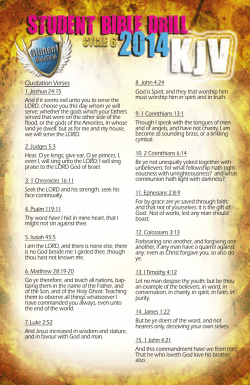

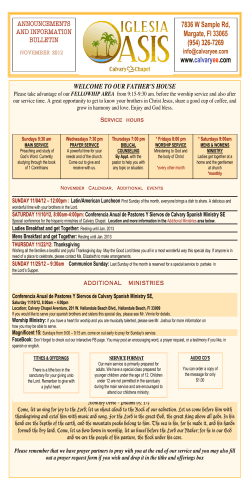
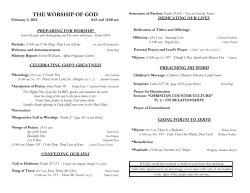

![Come, Thou Fount [E] E E/G#](http://cdn1.abcdocz.com/store/data/000132973_1-98b97f355f2485cfa1dce7ecc295b0f3-250x500.png)

